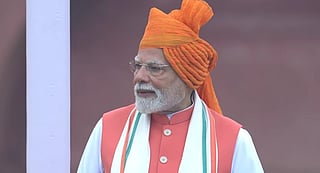- Home
- NewsGram USA
- India
- न्यूजग्राम
- World
- Politics
- Entertainment
- Culture
- Lifestyle
- Economy
- Sports
- Sp. Coverage
- Misc.
- NewsGram Exclusive
- Jobs / Internships

On August 15, 2025, Prime Minister Narendra Modi delivered his 12th consecutive Independence Day address from the Red Fort, surpassing former Prime Minister Indira Gandhi’s record for consecutive speeches. The address, delivered after hoisting the national flag, focused on national security, economic reforms, self-reliance, and India’s vision for 2047.
Before the speech, Modi posted on X, stating, “Wishing everyone a very happy Independence Day. May this day inspire us to keep working even harder to realise the dreams of our freedom fighters and build a Viksit Bharat. Jai Hind!” Here are the 10 key announcements made by PM Modi during his speech:
Modi announced Mission Sudarshan Chakra, a defence initiative to develop a powerful indigenous weapon system to neutralize enemy attacks and strike back, with a goal to cover all public places by 2035. Inspired by Lord Krishna’s Sudarshan Chakra, the system aims to enhance national security through advanced, homegrown technology.
In PM Modi's Independence Day speech he took a firm stand against infiltration, announcing a high-powered demographic mission to monitor population changes and curb unauthorized entries, citing threats to national security and societal harmony. He emphasized that infiltrators target vulnerable communities and resources, a concern no nation would tolerate.
He said, “Infiltrators are targeting our sisters and daughters, capturing lands of tribals… India won’t tolerate this. When the demography changes, it creates a danger for national security, and sows seeds of societal tensions. No country would give in to infiltrators, so how can India do it?”
Amid trade tensions following U.S. President Donald Trump’s threat of a 50% tariff on Indian imports, Modi vowed to protect farmers, livestock keepers, and fishermen, emphasizing their priority in India’s economic framework. This stance responds to ongoing India-U.S. trade negotiations, where India has resisted opening its agricultural sectors.
“Farmers, livestock keepers, and fishermen are India’s top priorities. Any policy that threatens their interests, Modi is standing like a wall against it. India will never compromise when it comes to protecting the interests of our farmers.”
This statement reflects India’s firm position in shielding its agricultural sectors from external economic pressures.
Modi launched the Rs 1 lakh crore Pradhan Mantri Viksit Bharat Rozgar Yojana, effective August 15, 2025, to provide Rs 15,000 to first-time private-sector job seekers and incentives to companies for hiring freshers. The scheme aims to benefit 3.5 crore youth, fostering employment and economic growth.
Modi announced next-generation GST reforms to be implemented by Diwali 2025, aimed at reducing taxes on daily-use items, benefiting MSMEs, and lowering costs for consumers. These reforms build on eight years of GST implementation, focusing on simplifying taxation and boosting economic efficiency.
“We are bringing next-generation GST reforms that will become a gift for you all this Diwali. Tax on ordinary items will be reduced significantly… it would be a big advantage for MSMEs and daily-use items will cost cheaper.”, said PM Modi.
Modi reiterated his vision for a developed India by 2047, marking 100 years of independence, under the theme ‘Naya Bharat.’ He emphasized modernizing ecosystems across sectors, reducing government interference, and leveraging youth potential to achieve this goal.
“India is working towards becoming ‘Viksit Bharat’ in 2047, when it will complete 100 years of independence. To fulfil this commitment, India is preparing a modern ecosystem in every sector, which will make our country self-reliant.”
PM Modi declared India’s intent to suspend the Indus Waters Treaty with Pakistan, citing its unjust nature and the need to prioritize Indian farmers’ access to water resources. This decision follows renewed tensions after the Pahalgam terror attack, reviving a 2016 stance.
“India has now decided, blood and water will not flow together. The people have come to realize that the Indus Waters Treaty is unjust. Water from the Indus River system has been irrigating the lands of the enemy, while our own farmers have suffered.”
Narendra Modi expanded the concept of Aatmanirbharta (self-reliance), emphasizing that it transcends economic metrics like imports, exports, or currencies, encompassing national strength in defense, energy, and critical sectors. He warned against dependency as a threat to freedom.
“Aatmanirbharta is not confined to rupee, dollar, pound… Aatmanirbhar is directly connected to our strength.”
This statement highlights a broader vision of self-reliance as a foundation for national resilience across multiple domains.
Modi hailed the armed forces for Operation Sindoor, a military response to the April 22, 2025, Pahalgam terror attack, which killed 26 people. The operation involved precision strikes on terror infrastructure in Pakistan and PoK, with full operational freedom granted to the forces.
“Today, from the ramparts of the Red Fort, I have the opportunity to salute the brave soldiers of Operation Sindoor… After April 22, we gave full freedom to the forces to choose the planning, target and timing, and our forces did something that never happened for decades… went inside the enemy territory and destroyed terrorist infrastructure.”
Modi took a strong stance against Pakistan’s nuclear threats, asserting that India would not bow to such tactics. This position aligns with India’s broader anti-terrorism policy and military readiness.
“India will not tolerate Pakistan’s nuclear blackmail.” [Rh/Eth/VS]
Also Read:
